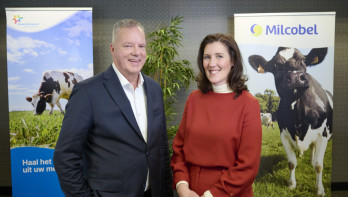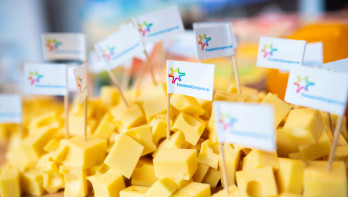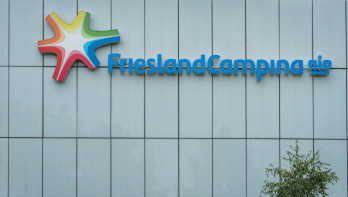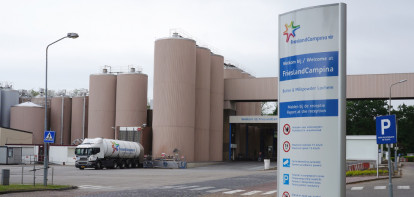Interview Tuncay Özgüner
'More sustainable than other cheesemakers in the EU'
Closing the revenue gap between private label cheeses and branded cheeses. That is the core task that Tuncay Özgüner, president Retail & Americas at FrieslandCampina, sees himself faced with. And according to him, there is good progress in that. The demonstrably lower footprint helps with that.
To illustrate the progress, he refers to the recent announcement from FrieslandCampina about the sign the significantly increased sustainability premiums that the company can pay out to its members. Özgüner: "This is mainly because we can show our customers as a company that we are doing much better in terms of sustainability than other cheese makers in the EU."
How does that translate into money; do you receive, for example, 10 or 20 cents more per kilo of cheese?
"We ask fixed higher prices from our customers, but do not mention specific amounts. With our data streams, through, among others, Foqus planet and On the way to PlanetProof, we have a fantastic advantage over our competitors, because we can clearly demonstrate what happens in the sustainability areas."
You are ahead of Arla's, DMK's, and others.
"We never make statements about individual companies. We look at the field as a whole, the benchmark. Compared to that, when it comes to sustainability regarding cheese, we perform 30% better than other producers in the EU and 60% better than others outside the EU, and you can see that reflected in the commercial results. Of course, the competition is also active and taking action, but we are ahead."
In the Netherlands and neighboring countries, your customers are familiar with the sustainability systems of FrieslandCampina, but what about further away, is there also a sustainability bonus to be gained in other markets?
"That varies sometimes, but is increasing. In retail, you often deal with large international players. Ahold, for example, generates 60% of its revenue in the US. So you have more major players. For example, Walmart and Costco. They see trends in Europe and often incorporate them elsewhere."
When it comes to sustainability, the emphasis nowadays is increasingly on CO2. Products must have a low CO2 footprint above all. This seems to be becoming more important compared to other aspects, such as grazing.
"This has to do with political choices, but also with clarity. Retailers and consumers understand CO2 reduction better than many other measures. It's less confusing that way. But grazing remains important too. It's not going away, but the goals for it have largely been achieved. The decline has stopped, but if it were to change, we can adjust with the help of Foqus planet. You can vary the rewards over the years with it."
"We have no problem having different types of entrepreneurs. In the past, you would sometimes hear that people weren't happy about it. I think having a variety of groups of entrepreneurs is a blessing. You can cluster them, as long as you have enough mass, and offer different types of products."
The cheese market has become quite complex due to a changing society, changing eating moments and consumption methods, and also due to presence in more and more markets.
"That's correct. Therefore, we need very good insight into the eating culture per country; when and how cheese is eaten and by whom. In some countries, they eat a piece of cheese just before dinner in the afternoon, while we don't do that. We also found out that at Dutch drinks, Dutch cheese was often missed. That's when we came up with De Rotterdamsche Oude. With our Parrano cheese, we discovered something else. With that, we could offer a range of cheeses that is almost equivalent to Italian cheeses like Grana Pardano, but at a lower price. It's about knowing the market, habits, and patterns. For example: the later in the day, the older the cheese consumed, or: the younger you are, the younger the cheese you eat."
Tasty Dutch cheese is often missed on snack platters, according to Tuncay Özgüner.
You are the president Retail & Americas, the top boss of one of the seven business groups of FrieslandCampina. What percentage of the turnover comes from cheese?
"It's about 70%, or maybe even 80% of the turnover. At FrieslandCampina, about 50% of all milk goes to cheese. Our business group accounts for 25% of all milk (the remaining 25% is with Trading). The activities of the different groups partly overlap, but together we are responsible for the results. So, we don't compete internally."
How much cheese does FrieslandCampina produce?
"Roughly 600 million kilos. You can broadly divide that cheese into three types: 1. mozzarella, which is mainly used in industrial applications, 2. foil cheese, a type of Gouda cheese, and 3. natural cheese, also usually Gouda. What we are doing with the last two types is claiming the heritage with natural cheese. Gouda cheese is originally a Dutch product and we want to emphasize that more, even though we can no longer claim the type name. The whole world makes Gouda. We do this claiming of the heritage with brands like De Rotterdamsche Oude and Lutjewinkel 1916. In addition, we have many brands that are mainly known abroad, such as Frico and El Gallo Azul (in the Mexican market). In the Netherlands, we also have Milner. Within the foil cheese, we are moving towards uptrading. This means that we position this cheese higher in the market based on sustainability features, among other things."
In recent years, vegan cheese has also become more prominent. How do you view that and what do you expect from that segment?
"It's a very small segment and will likely remain so. Cheese is made for its nutritional value and it must be tasty. Vegan cheese lags behind on both points. At Velder, where I previously led, we also had vegan cheese in our range, but on average, vegan is not the tastiest cheese. That's also because cheese is a much more complex product than a milk alternative. It's about craftsmanship, texture, and aging. Cheese has a tradition of hundreds of years. It's really a challenge. They can't even replicate foil cheese, let alone natural cheese that has been aging in the warehouse for two years."
The cheese marketing has changed. Does the customer approach remain the same?
"No, another way to increase the profitability of our cheese production is by adopting a different approach. In the past, we were heavily involved in the tender business, where we bid on supply contracts for three or four months. Then a new round would start. Instead, we want to move more towards strategic partnerships for longer durations. We offer the retail a 'premium private label' product, along with a corresponding product portfolio. Such a collaboration provides more continuity, also saves costs, and should therefore give us an advantage."
"In this way, we are trying to empty the basket of Trading, where products not sold by other business groups end up. It is our challenge to do this. Consumers are increasingly moving from brand to private label, and retailers are bundling more purchasing power. You can see it as a risk. I see it as an opportunity, but you have to play the game very well. The game has become more cunning than it was."

Klaas van der Horst
© DCA Market Intelligence. Op deze marktinformatie berust auteursrecht. Het is niet toegestaan de inhoud te vermenigvuldigen, distribueren, verspreiden of tegen vergoeding beschikbaar te stellen aan derden, in welke vorm dan ook, zonder de uitdrukkelijke, schriftelijke, toestemming van DCA Market Intelligence.



